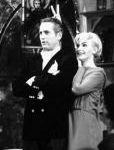Strange Coincidence: Titanic Disaster Foretold —
Status: True (kind of, though I wouldn't use the word 'foretold')
2spare.com offers a list of the
Top 15 Strangest Coincidences. It's an interesting list (Thanks for the link, Kathy!), and as far as I can tell all the coincidences they list are basically true. Or, at least, they've all been widely reported, and I haven't been able to find any false statements in them yet. (I didn't analyze all of them that closely.)
But one coincidence I found particularly interesting, that I hadn't read about before, involved an American writer named Morgan Robertson who in 1898 wrote a novella titled
Futility. It told the story of a massive ocean liner named the
Titan that hits an iceberg while crossing the Atlantic and sinks. Fourteen years later, in real life, the
Titanic hits an iceberg while crossing the Atlantic and sinks. Very weird.
The coincidence was definitely not lost on Robertson who immediately had his story republished after the
Titanic sank, with the new title
Futility and the Wreck of the Titan. Apparently he tweaked the republished story a little bit to make the similarities even more striking. (He altered the dimensions of his fictional boat to make it more like the
Titanic.) But the biggest similarity of all (
Titan vs.
Titanic) he didn't need to tweak. That was legitimately in the original story (which can be read
here).
This coincidence is discussed on
skepticwiki, which points out that the story is often used by believers in the paranormal as evidence of premonition. But as they point out:
"The most startling coincidence above all is the similarity in names between Titan and Titanic. In 2003, Senan Moloney wrote an article for the online resource Titanic Book Site where he finds three occasions before the writing of "Futility" where a ship named Titania sank at sea, and one of these bore certain similarities to the eventual Titanic disaster. It could be that, inspired by this disaster (or all three) Morgan Robertson chose to base his ocean liner's name on their names."
Still, it is a very striking coincidence. But sometimes strange coincidences do happen. That doesn't make them paranormal.
In fact, 2spare.com leaves off its list what I find to be the most amazing coincidence in history: that when the Pilgrims landed on Plymouth Rock in 1620, one of the first native Americans they met not only spoke fluent English, but had actually lived in England for a number of years and had crossed the Atlantic numerous times. (He was more cosmopolitan and well-traveled than they were.) To me this is just amazing that out of the entire huge continent the Pilgrims managed, by sheer luck, to find the one guy,
Squanto, who spoke English. It's like traveling halfway across the galaxy, landing on a planet, and discovering that the inhabitants speak English. (Of course, that happens in
Star Trek all the time.) And without Squanto's help the Plymouth Colony probably wouldn't have lasted through the winter, and American history itself might have taken a very different course. But it was just a coincidence. Nothing supernatural about it (though the Pilgrims definitely viewed it as an example of divine favor).

 I missed this story last month, but better late than never. Early in June a lot of newspapers ran this photo of Qiao Yubo, a Chinese woman supposedly pregnant with five babies. Apparently it was one of the most viewed photos on Yahoo! News. The caption accompanying the photo stated that she was 1.67m tall, five months pregnant, had a waist measuring 1.75m, and was eating seven meals a day.
I missed this story last month, but better late than never. Early in June a lot of newspapers ran this photo of Qiao Yubo, a Chinese woman supposedly pregnant with five babies. Apparently it was one of the most viewed photos on Yahoo! News. The caption accompanying the photo stated that she was 1.67m tall, five months pregnant, had a waist measuring 1.75m, and was eating seven meals a day.  I've received a few emails asking me for info about noscruf.org. It appears, on the surface, to be a site created by the NO SCRUF organization, which stands for "National Organization of Social Crusaders Repulsed by Unshaven Faces." It's supposedly a growing coalition of women who have vowed not to shave until men start shaving. Their website, which features lots of photos of hirsute models (obviously photoshopped, or using glue-on hair), proclaims: "Let's end the trend of prickly, scratchy, stubbly faces. We're not going to shave until men do." Last week a No Scruf protest rally was also held in New York's Herald Square featuring TV stars Kelly Monaco and Brooke Burke.
I've received a few emails asking me for info about noscruf.org. It appears, on the surface, to be a site created by the NO SCRUF organization, which stands for "National Organization of Social Crusaders Repulsed by Unshaven Faces." It's supposedly a growing coalition of women who have vowed not to shave until men start shaving. Their website, which features lots of photos of hirsute models (obviously photoshopped, or using glue-on hair), proclaims: "Let's end the trend of prickly, scratchy, stubbly faces. We're not going to shave until men do." Last week a No Scruf protest rally was also held in New York's Herald Square featuring TV stars Kelly Monaco and Brooke Burke.  Vienna boasts the world's only vegetable orchestra. Members of this orchestra play only instruments made out of vegetables. Among their instruments: the cuke-o-phon, the radish-marimba, and the carrot-flute. (A few kitchen utensils such as knives and mixers are also used, on occasion.) And I love this part of the concept: "the instruments are subsequently made into a soup so that the audience can then enjoy them a second time"
Vienna boasts the world's only vegetable orchestra. Members of this orchestra play only instruments made out of vegetables. Among their instruments: the cuke-o-phon, the radish-marimba, and the carrot-flute. (A few kitchen utensils such as knives and mixers are also used, on occasion.) And I love this part of the concept: "the instruments are subsequently made into a soup so that the audience can then enjoy them a second time" Last week the London Times printed a photo that, so it claimed, was the only known photograph of Mozart's widow (Constanze), taken in 1840 at the home of Swiss composer Max Keller when she was 78 years old. (She's supposedly the woman on the far left.) However, the photo has generated controversy online, where a number of scholars have labeled it a hoax.
Last week the London Times printed a photo that, so it claimed, was the only known photograph of Mozart's widow (Constanze), taken in 1840 at the home of Swiss composer Max Keller when she was 78 years old. (She's supposedly the woman on the far left.) However, the photo has generated controversy online, where a number of scholars have labeled it a hoax. You see a large cockroach on your floor. If you don't scream and run the other way, you might try to kill it. But it won't squash like a normal roach. So you pick it up, and then you see the advertisement printed on the bottom of it: "See how easy it is to get into your house? D.D. Drin. Insect Elimination."
You see a large cockroach on your floor. If you don't scream and run the other way, you might try to kill it. But it won't squash like a normal roach. So you pick it up, and then you see the advertisement printed on the bottom of it: "See how easy it is to get into your house? D.D. Drin. Insect Elimination."










 Did car manufacturers ever offer the option of an in-car phonograph? I would have thought not. After all, the technological challenge presented by such a product is obvious. How can you get it not to skip? But trusting in the common sense of car manufacturers is never a wise thing to do. So in this respect it's probably obvious that, yes, such a feature was once offered, though for a very brief period of time. Predictably, the in-car phonographs skipped like crazy and were pulled from the market.
Did car manufacturers ever offer the option of an in-car phonograph? I would have thought not. After all, the technological challenge presented by such a product is obvious. How can you get it not to skip? But trusting in the common sense of car manufacturers is never a wise thing to do. So in this respect it's probably obvious that, yes, such a feature was once offered, though for a very brief period of time. Predictably, the in-car phonographs skipped like crazy and were pulled from the market. Some of the things I post about aren't the most intelligence-enhancing things in the world. I know that. But what follows is really scraping the bottom of the barrel, so to speak. It's a woman who appeared on the Maury Povich Show who claims to be Pickle-Phobic. The mere sight of pickles sends her into a state of screaming panic. Her fear of pickles is ruining her life. Here's what she has to say:
Some of the things I post about aren't the most intelligence-enhancing things in the world. I know that. But what follows is really scraping the bottom of the barrel, so to speak. It's a woman who appeared on the Maury Povich Show who claims to be Pickle-Phobic. The mere sight of pickles sends her into a state of screaming panic. Her fear of pickles is ruining her life. Here's what she has to say:  I don't like to make fun of people's appearances (doing so disturbs my soft, liberal sensibilities), but when I saw this picture of Ann Coulter I thought that it was either photoshopped, or she had the strangest looking hand I've ever seen in my life. In fact, I would hesitate to even use the words 'hand' to describe that thing at the end of her arm. Instead, the phrase 'raptor claw' seems like it might be more appropriate. The thing is almost as long as her forearm! But a quick check on anncoulter.com (which, I assume, is her website) reveals that the picture is posted there. Which means that it must be real. Freaky. I think I'm going to be having nightmares about this. (Via US Magazine)
I don't like to make fun of people's appearances (doing so disturbs my soft, liberal sensibilities), but when I saw this picture of Ann Coulter I thought that it was either photoshopped, or she had the strangest looking hand I've ever seen in my life. In fact, I would hesitate to even use the words 'hand' to describe that thing at the end of her arm. Instead, the phrase 'raptor claw' seems like it might be more appropriate. The thing is almost as long as her forearm! But a quick check on anncoulter.com (which, I assume, is her website) reveals that the picture is posted there. Which means that it must be real. Freaky. I think I'm going to be having nightmares about this. (Via US Magazine) Ken Lay was reported dead on Wednesday. The medical examiner ruled the cause of death to be severe coronary disease. But almost as soon as word of his death hit the internet, the conspiracy theories started. Scott Adams summed up what many were thinking in his Dilbert Blog:
Ken Lay was reported dead on Wednesday. The medical examiner ruled the cause of death to be severe coronary disease. But almost as soon as word of his death hit the internet, the conspiracy theories started. Scott Adams summed up what many were thinking in his Dilbert Blog: 
 Christophe Thill sent me a link to Huggable Urns (they're teddy bears that hold cremains) along with the message: "This has to be a hoax? Right? Right?" Sorry, Christophe. I don't think so. The Huggable Urns look real enough, and if you click on the 'Buy Now' button on the products page, it takes you to a PayPal payment page, which is usually a good sign that a product is real.
Christophe Thill sent me a link to Huggable Urns (they're teddy bears that hold cremains) along with the message: "This has to be a hoax? Right? Right?" Sorry, Christophe. I don't think so. The Huggable Urns look real enough, and if you click on the 'Buy Now' button on the products page, it takes you to a PayPal payment page, which is usually a good sign that a product is real.  A recent ad for Kellogg's Frosted Flakes shows a blond-haired kid dancing around singing "They're going to taste great!" I think this is a British ad. At least, I've never seen it here in America. And all the references to it I've found occur in the British press. For instance, David Whitehouse writes in the Guardian:
A recent ad for Kellogg's Frosted Flakes shows a blond-haired kid dancing around singing "They're going to taste great!" I think this is a British ad. At least, I've never seen it here in America. And all the references to it I've found occur in the British press. For instance, David Whitehouse writes in the Guardian:  Supposedly this is a picture of a Russian nuclear sub cruising by a beach somewhere in Russia. I've noticed this picture posted on a number of blogs, but the info about it comes from strategypage.com. However, no source for the photo is indicated. Is it real? I don't see any reason why it wouldn't be. Here in San Diego it's quite common to see nuclear subs cruising past, especially if you're at Cabrillo Point or Coronado. I imagine the same must be true in Russia.
Supposedly this is a picture of a Russian nuclear sub cruising by a beach somewhere in Russia. I've noticed this picture posted on a number of blogs, but the info about it comes from strategypage.com. However, no source for the photo is indicated. Is it real? I don't see any reason why it wouldn't be. Here in San Diego it's quite common to see nuclear subs cruising past, especially if you're at Cabrillo Point or Coronado. I imagine the same must be true in Russia.


